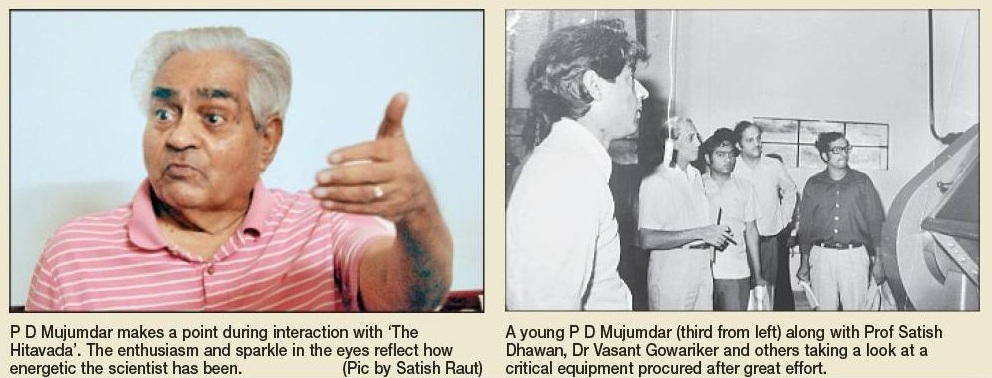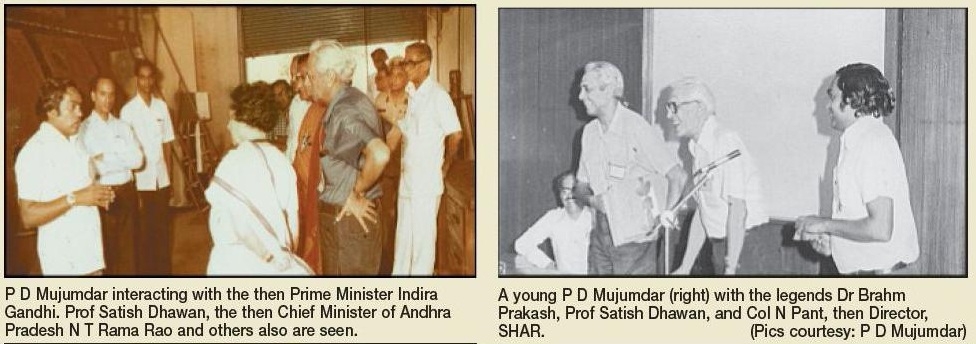‘Success is yours, failure is mine’ makes one a great leader: Mujumdar
19 Sep 2021 09:21:55

By Kartik Lokhande :
THE bungalow in the lane from Aath Rasta Chowk to Bal Jagat in Laxmi Nagar stands out even today. Despite new high-rises springing up around it has retained its character and construct. Same like the man, P D Mujumdar, whose name is on the plaque outside this bungalow. He has also retained the character of a passionate man and construct of a scientist. Not many of present generation know that this man, Prakash D Mujumdar, is a stalwart in his own right. He was groomed -- as a scientist and as a fine human being -- in the company of legends and pioneers like Vikram Sarabhai, revered as father of India’s space programme; Prof Satish Dhawan, who succeeded Sarabhai as Chairman of Indian Space Research Organisation (ISRO); Prof U R Rao, the successor of Prof Dhawan; Vasant Gowariker, Advisor to the Prime Minister from 1991-93; Dr Brahm Prakash, the first Director of Vikram Sarabhai Space Centre; ‘Bharat Ratna’ Dr A P J Abdul Kalam, who rose to become President of India. Now 84, Mujumdar still has vivid memories of his days at ISRO. A conversation with him, which soon breaks the boundaries of question-and-answer type interview and traverses on to the path of free-wheeling chat, reveals that here is the man who has seen Space Science & Technology Centre (SSTC) established in Thumba, take shape of ISRO, which has to its credit several astounding successes over the years. Also, one realises that Mujumdar has a sharp memory to the extent of remembering the exact dates and names and designations from the chapters of history of ISRO. Mujumdar gives credit of his evolution from a chemical engineering pass-out from Laxminarayan Institute of Technology (LIT), Nagpur, to an ISRO scientist of eminence, to the ‘institutional sanskar’ he got from the legends when he was a young team member of ISRO.

“After starting my career from Nepa Nagar paper mill, I served my time at newly established New Explosive Factory (now, Ordnance Factory) at Bhandara. However, I had an urge to do something more. My superior there, Mr. Chandrashekharan, realised this. When I applied for SSTC job, he was very happy,” recalls Mujumdar. With sparkle in eyes, he continues, “I got selected for SSTC. When I went for an interview, a tall man took my interview. He was none other than Dr Vasant Gowariker!” Then on started his journey of pursuit of excellence, wholehearted participation in the shaping up of ISRO, and evolution of India’s space programme. Of course, when one pursues his passion, one is so deeply engrossed in job at hand that family members are not always pleased with this. Mujumdar’s life partner Usha, equally well-read and composed, recalls how their children -- two daughters and one son -- could meet their father sometimes only once or twice in a week. On one occasion, when one of the daughters fell very sick, the mother had to take her to Madras (now Chennai) for treatment. “It was only after we reached Madras, this man (Prakash Mujumdar) came,” she recalls. But, then, she was aware of the high goals that her husband was pursuing. During his tenure at ISRO, Mujumdar faced several ‘situations’ too. As he tells, on one occasion, he was to arrange transport for a critical equipment. An administrative officer in the establishment asked him whether he had powers to do so.
“I spoke to Prof Dhawan, who immediately sent a Telex message delegating the requisite powers to me,” he adds. In his years with ISRO and its various establishments, he saw several highs and lows too. There was an occasion when an entire building came crashing down due to an explosion. Every one was in a state of shock. But, he points out, on every such occasion, the pioneers who shaped ISRO came forward to draw lessons, to improvise, to pursue the goals despite lack of resources and setbacks. May it be Prof Dhawan or Gowariker or Dr Kalam, all were such great leaders that they enshrined one principle in ISRO’s institutional inheritance -- “Success is yours, failure is mine”. “A true leader has this quality. This leadership principle also motivates the team members to try harder to achieve success. Also, in an organisation, if a superior adopts this principle in front of everyone, it gets ingrained in the minds of juniors that they have to follow this institutional inheritance when they assume leadership positions,” Mujumdar elaborates. Institutional values, in which merit is placed higher than mere educational qualifications, make one a fine human being. Mujumdar, who retired from ISRO in 1997, played a key role in building the Solid Propellant Space Booster Plant in Sriharikota.
All through his service years and even later, he remained committed to contributing to India’s scientific advancement. What kept him motivated all these years? He replies, with values he got from ISRO. “You know, ISRO is great because of following reasons -- continued great leadership, total dedication, unparalleled work culture, colleague authority, no hierarchy as far as merit and scientific pursuit are concerned, and maximum down-delegation of powers. Besides, the quality of successive ISRO Chairmen -- Success is yours, leave failures to me,” he explains with pride. As has been the case with learned men, Mujumdar has been a simple man. He worked long hours and practised simplicity. Often, despite day-long hectic work schedule, meetings were called at the residence of Dr Vasant Gowariker at night. Dr Vasant Gowariker was well aware of how this would affect the family of scientists. So, he started calling spouses of scientists too. The men would have their meeting and brainstorming at night, while the women had conversations with each other, recalls Usha Mujumdar. She adds with pride another facet of the personality of her husband, “We did not buy white car, as it was the colour of official car. For, he did not want people to get confused and think whether he had used office car for family.” Obviously, when Prakash Mujumdar retired, he had a lot to share.
“During one conversation, Vishwasrao Kanade asked me to write a book based on these experiences of my years in ISRO, that too, in Marathi,” Mujumdar recalls. Gowariker supported the idea and asked him to show the draft to noted litterateur Principal Ram Shewalkar. When the draft was ready, Mujumdar couple showed it to Shewalkar, who was all praise for it. Rajhans Prakashan published the book. “Despite it being my first book, the publisher paid a cheque to me,” he adds with a satisfying smile on his face. He also served as head of the Rajiv Gandhi Science and Technology Commission, Government of Maharashtra, at Nagpur. The man of extraordinary merit has had a great innings as an excellent leader and a scientist with integrity. He now lives a content life along with his spouse, and the families of his three children spread across three continents -- North America, Asia, and Australia, with a bagful of brilliant stories to share.
